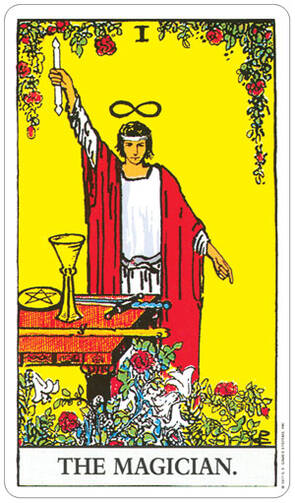The problem with God—and even God’s friends will admit this—is God’s elusiveness. Just when you think that you’ve had a solid experience of God—like Abraham, watching the flame pass through his sacrifice, or the disciples, seeing the Lord Jesus transfigured—God disappears. God so thoroughly absconds that one can’t help but to wonder if God was ever there. Small wonder that some folk, some good Christians, invest time and effort, trying to channel God into something reliable.
The English writer, and ardent Anglican, Charles Williams was a good example. He was a member of the Inklings, an informal, and deeply Christian, discussion society, composed, in large measure, of Oxford dons. Like so many of his fellow thinkers and friends, C.S. Lewis among them, Williams loved the Church of England. But in addition to her liturgies, he was also fascinated by the occult, particularly the teachings of Arthur Waite, who created the Tarot cards that still bear his name and founded the Fellowship of the Rosy Cross. “Named after the principal symbol of Rosicrucianism, a cross with a white rose, symbolizing the way of Jesus Christ with occult wisdom at its center.”
Williams was fascinated by the secret rites of the group, “stitched together from Catholic, Egyptian, and Rosicrucian threads.” Philip and Carol Zaleski record in The Fellowship: The Literary Lives of the Inklings (2015) that Williams
All of this seems downright silly to those on the outside, but that’s also true of even very good things, like the liturgy of the church, or the baptism of a baby, or the changing of the guard at the Tomb of the Unknown Soldier. Many of his fellow Inklings thought as much about Williams’s occult interests, but try to sympathize with his desire to see God, to experience God. The problem with God is God’s elusiveness. Why can’t we channel God when and where we want? Is it so wrong to want to see what Abraham and the disciples saw?
Not at all. Even if we cannot articulate it, we were created with the longing to look upon the face of God. Yet God’s transcendence, God’s mystery, means that God can’t be conjured. No words or rituals capture God, not even those most Catholic. Many Christians, who never dabble with the occult, nonetheless want God to be channeled through their devotions, but God isn’t a mysterious object to be cajoled or collared. One could call God a mysterious person, provided one understands the terrible strain put upon both noun and adjective. God is a mystery like no other; a person like no other.
And, oddly enough, though we search for this utter mystery in the extraordinary and the unrepeatable, God empties God's self into mundane repetition. One might say that the mystery of God is too large, too loving, too lenient to be confined to the extraordinary and the unique. God is there is the movement of the wind, in sunrise and sunset, in the words read—typically, not all that well—each Sunday in church.
While we rout for a ritual that would capture God, God empties himself into the rites of the church. God so fully saturates these rituals that we can fail to see God, even when look directly upon him. When the priest raises the broken host, just before holy Communion, and says, “Behold the Lamb of God, behold him who takes away the sins of the world, blessed are those called to the supper of the Lamb,” all hear and see, but not everyone listens. Not everyone perceives.
The notion that Mass is “as good as it gets” with God, seems downright dull. Surely there exists a greater ingenuity, insight and imagination than that which the liturgy of the church offers. A fellow Inkling of Charles Williams didn’t think so. A Catholic, he came back to the same dull liturgy every day; the same rite of confession each week. When his son told him that he was going through a crisis of faith he wrote back, urging more frequent attendance at Mass, adding, “Choose a snuffling or gabbling priest or a proud and vulgar friar, and a church full of the usual bourgeois crowd.” For him, it was the presence of Christ that counted, not his courtiers. But perhaps he was an unimaginative sort, who didn’t mind missing God by eschewing the occult for the ordinary. He was a writer as well. Yes, it’s just too bad J.R.R. Tolkien wasn’t as imaginative as Charles Williams.
Genesis 15: 5-12, 17-18 Philippians 3: 17-4:1 Luke 9: 28b-36








